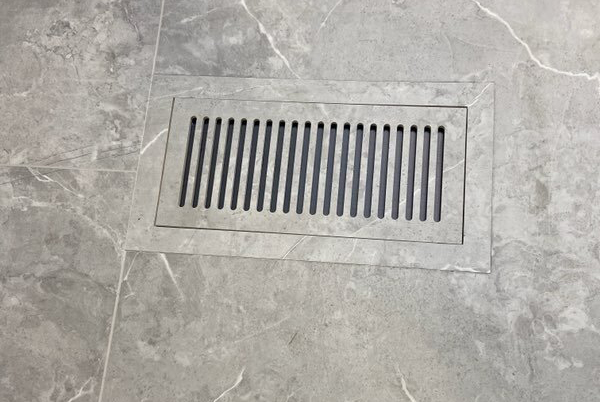Custom vent covers are an incredible way to completely customize a new build or remodel from top to bottom. They create a seamless and upscale look that elevates your design to the next level. They complement your client's flooring investment with quality and personalized details.
As we know, vents are the holes in the floor or wall that allow heated or cooled air to pass into the room from your HVAC system. Covering that opening is the job of a vent cover. Deciding which type of vent to use and how to customize it for your customers is one of those details to consider from the start. It’s much easier to include them during the design process rather than trying to fit them in afterward.
Below we explain the different types of floor vents and customization options we can help you create.

Flush Mount
Also known as Inset – To install, the vent frame is placed over the vent opening and the flooring is laid directly into a frame set at the vent site at the same height as the flooring. There is a removable vent that drops into the frame for vent access.
Pros:
These vents fit smoothly and seamlessly into your new floor. Your new hardwood floor takes more of the spotlight when the vents are inconspicuous.
Since they sit flush, they won’t negatively influence furniture placement or traffic patterns. No more wobbly side tables or tripping toddlers!
Cleaning is easier without that grit-trapping and vacuum or broom-deflecting lip.
Cons:
Must have the vent at time of installation.
Fitting them in after the fact requires a careful layout and precision cuts. It’s also a bit nerve-wracking watching holes being cut in your beautiful new floors!
Even when installed along with the flooring, these are generally more expensive than drop-in vents.

Top Mount
Also known as overlap/drop-in/self-rimming – flooring is laid around the vent leaving a hole for the vent to drop into and the perimeter ledge rests on top of the flooring
Using surface mount vents is a great alternative option for replacing existing vents. These will not require any cutting to be installed, simply replace the old vents with the correct size and drop them in.
Pros:
These are very easy to install because they literally just ‘drop’ into the floor opening. They’re generally also a less expensive option than flush-mount vents.
Cons:
The raised rim of these vents sometimes gets in the way of furniture placement or floor traffic. As small as that rim is, it can topple toddlers who aren’t steady on their feet yet.

Cold Air Intake
Large vent where air is drawn back to the HVAC system, sometimes these are located on the wall. You'll encounter these less frequently but there are multiple standard sizes available that can be stained to coordinate with typically hardwood flooring.
Customized Vent Covers
CFM has a variety of local partners who specialize in custom vents to coordinate with any flooring material. We have the ability to create custom solutions for your exact project needs. Using your flooring material, they have the ability to create a custom solution that works for you and your project. From hardwood and LVT to tile/stone and carpet, you can create a vent cover that fits the design of your room and takes it to another level of detail. When planning your project, be sure to talk with any of our sales team members about who to contact to create something extra special for your floors.
Aria Vents
A favored brand that suits any flooring material we sell is Aria Vent from Metropolitan Hardwood floors.
Aria Vent is the first customizable vent cover that can be adapted to any surface, with any material - tile, hardwood, carpet, drywall vinyl etc. A minimalist, modern design that fits right into your space. Customize with any material: tile, vinyl, hardwood, carpet, drywall etc.

Benefits of Aria Vents
You can have the same air vent across all your spaces, regardless of your varying floor materials or vent location (floors, walls or ceilings). Keep all the hardware accessories consistent throughout the home to create one cohesive, repetitive design feature.
Since the product is meant to be customized to match the surrounding flooring or wall, it’s not a turnkey solution. As long as you have the flooring material on hand, you can customize the vent during or after installation.
How to prepare Aria vent covers for installation:
Cut the flooring plank or tile to size, and if the flooring runs in a different direction to the vent, multiple pieces may be required.
Insert a filler such as a piece of plywood to make the inserted piece flush with the frame.
Without proper tools and the skills to use them, it would be hard to make precise cut and the result may not be as elegant as you’d like it to be. Even if you could achieve a fine finish with basic hand tools, you would have to repeat the process for additional vents. If a homeowner doesn't feel confident to cut the material to size, they should consider hiring a flooring professional.


































